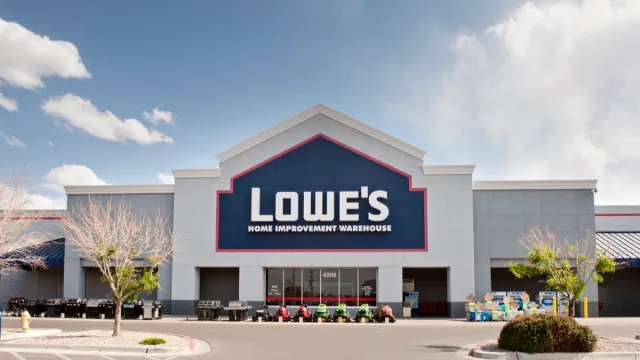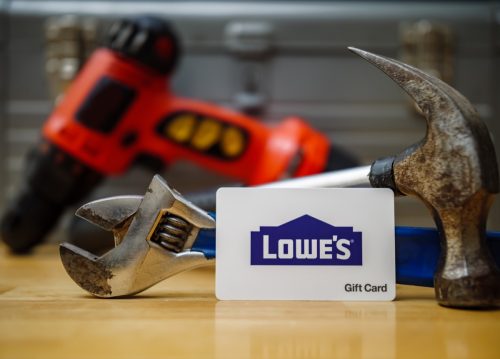If You Get This Message From Lowe’s, Don’t Open It, Experts Warn

These days, retailers are able to connect with shoppers more easily than ever before. From texts about new sales to email updates about online orders, you likely receive countless messages from your favorite stores every week. But while you’re sorting through dozens upon dozens of correspondences from companies to figure out what to keep and what can be deleted, be careful you don’t fall into a trap. There’s a new scam involving one of the nation’s most notable home improvement retailers, and it could easily catch you off-guard. Read on to find out what Lowe’s message you should make sure to avoid clicking.
READ THIS NEXT: Lowe’s Is Under Fire From Shoppers for an “Enormous Amount of Damage.”
The Lowe’s name has been used by scammers in the past.

Con artists are always looking to capitalize on the connection between consumers and their favorite companies—and Lowe’s is no exception. The home improvement retailer has previously been involved in several scams this year. Back in February, the experts at Snopes cautioned consumers against falling victim to a Russian-based scam that was working to trick shoppers into thinking they’d receive a $100 Lowe’s gift card in exchange for taking a survey.
Then in May, a spokesperson for Lowe’s said the retailer was working to “maintain practices designed to help reduce fraud” after a Florida man lost more than $7,000 to a scammer demanding he buy gift cards from Lowe’s and Target to avoid criminal charges. Despite this, the home improvement retailer has just found itself at the center of another concerning ploy.
Shoppers are now receiving fake messages using the retailer’s name.

This summer is proving to be sweltering across the country, but if you think you’re going to be cooling off with a free air conditioner from Lowe’s anytime soon, think again. On July 21, the experts at Snopes released an alert about a new scam involving the home improvement retailer and air conditioning. According to the fact-checking website, at least one consumer has received a recent email that reads, “Congratulations! You are the lucky online winner of a brand new [Lowe’s] Sweepstakes BTU Portable Air Conditioner entry!”
As it turns out, there is no such giveaway happening from Lowe’s. “The email was a scam,” Snopes confirmed. “Scammers were pretending to be Lowe’s in an apparent phishing attempt to get people’s personal information, such as credit and debit card numbers.”
RELATED: For more up-to-date information, sign up for our daily newsletter.
If you receive this Lowe’s email, don’t open it.

Snopes did not reveal how many shoppers are believed to have received this fraudulent Lowe’s message or whether there are similar forms of it going around, but their message is the same as with any phishing email: Don’t open it.
“We advise readers to never click links or call phone numbers that appear in these kinds of scam emails,” Snopes said. “The links will lead to phishing attempts, and the phone calls will connect you with scammers who likely will try to lure sensitive data from you.”
According to the Lowe’s website, the home improvement retailer “will never ask you to email personal information” such as your password, social security number, bank account details, or credit card numbers. The company urges consumers to “be aware of online scams offering free gifts” through fake emails.
There are telltale signs when you’re being targeted by scam messages.

When it comes to messages from retailers, there are usually key things you can look out for to determine if you’re being scammed. According to Snopes, phishing emails tend to contain obvious grammatical errors and are sent from email addresses that may look unofficial. In regards to Lowe’s, this could involve an email address that ends with more than just the official “@lowes.com” ending.
“The sender may have something like, ‘[email protected].’ This would not be a legitimate email address for Lowe’s,” Snopes explained, adding that this would be a “sign of something suspicious going on.” If you think you’ve fallen victim to a free gift scam involving Lowe’s, the retailer advises consumers to file a report with their local police and on the Internet Crime Complaint Center website (ICCC).